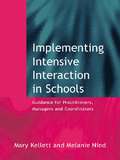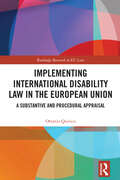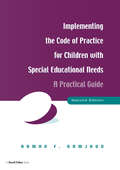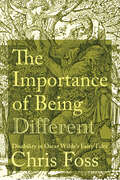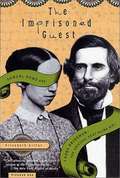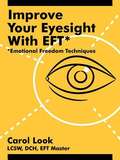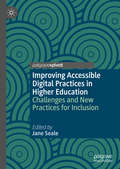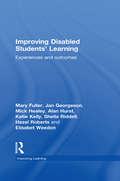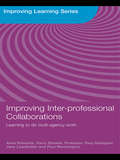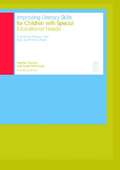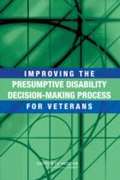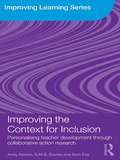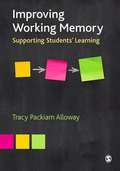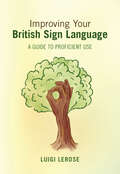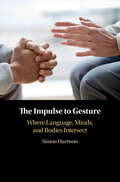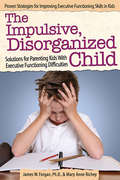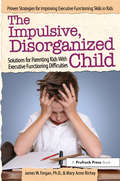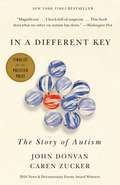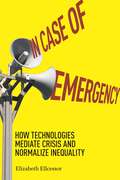- Table View
- List View
Implementing Intensive Interaction in Schools: Guidance for Practitioners, Managers and Co-ordinators
by Mary Kellett Melanie NindFirst Published in 2003. Routledge is an imprint of Taylor & Francis, an informa company.
Implementing International Disability Law in the European Union: A Substantive and Procedural Appraisal (Routledge Research in EU Law)
by Ottavio QuiricoThis book investigates the implementation of disability rights and duties in the European Union, aiming to understand its functioning and explore ways forward through a critical analysis of the Convention on the Rights of Persons with Disabilities (CRPD) within the context of international regulation. Along the lines of the integration of fundamental rights within the common market, the EU has indeed progressively adopted meaningful regulation to advance disability rights, which are now essentially shaped by the CRPD. The research considers the interaction between law and policy at the international, EU and Member States’ level, focusing on three essential elements, including the sources of disability law, institutional mechanisms and substantive regulation. Grounded in the distinction between primary rules on law-making and secondary norms on enforcement, the analysis unfolds against the background of the ‘twin’ transitions on sustainability and digitalisation and encompasses the Council of Europe system, particularly in the light of the foreseeable accession of the EU to the European Convention on Human Rights. Arguably, following the progressive development it has facilitated in other regulatory areas, the Court of Justice of the European Union can provide a decisive contribution to advancing inclusiveness for people with disabilities in the Union.The book is a useful resource for practitioners, policymakers, academics, students, researchers and anyone interested in EU and international disability law and politics.
Implementing Systematic Interventions: A Guide for Secondary School Teams
by Hank Bohanon Lisa Caputo Love Kelly MorrisseyAccessibly written and specifically designed for secondary schools, Implementing Systematic Interventions provides you with the tools you need to successfully organize for and smoothly implement schoolwide intervention strategies. Discover how to: • Organize administrative support and leadership teams; • Create effective communication techniques and protocols; • Use effective models to select school-specific priorities; • Support staff and students during the transition; • Identify desired outcomes and assess whether or not they've been achieved. Featuring supplemental online resources, this essential guide helps your team avoid common mistakes, identify clear goals, and implement successful interventions to help every student succeed.
Implementing the Code of Practice for Children with Special Educational Needs: A Practical Guide
by Ahmad F. RamjhunThis new edition has been revised to bring teachers and other education practitioners up to date with the revisions to the Code of Practice due to come into force in January 2002. The author was a member of a working party for the National Advisory Group for special educational needs, with a remit to assist with the revision of the Code. This book reports on the outcomes, and details advice and guidance on the key tasks for its effective implementation.
The Importance of Being Different: Disability in Oscar Wilde's Fairy Tales (Peculiar Bodies)
by Chris FossUnderstanding Oscar Wilde&’s characteristically unique approach to writing difference Over the course of his remarkable career, Oscar Wilde published two volumes of fairy tales: The Happy Prince and Other Tales and A House of Pomegranates. Both collections feature numerous stories with protagonists who may be said to be disability-aligned, owing to their pronounced physical differences. In The Importance of Being Different, Chris Foss explores the way that Wilde&’s stories problematically replicate many of the Victorian era&’s typical responses to disability but also the ways they diverge, offering a more progressive orientation—both through more sympathetic identifications with disability-aligned characters and through a self-conscious foregrounding of the mechanisms of pity and the consumption of pain. The first ever monograph to examine Wilde&’s work through a disability studies lens, this groundbreaking book encompasses all of his fairy tales as well as his writings during and after imprisonment. Even though Wilde unflinchingly represented the extent to which these peculiar bodies suffered rejection by society, he encouraged his readers to embrace them and to advocate for emotional responses that engage love and kindness toward both individual transformation and social change.
The Imprisoned Guest: Samuel Howe and Laura Bridgman, the Original Deaf-Blind Girl
by Elisabeth GitterDid you ever wonder what inspired Helen Keller's mother to have such high hopes for her daughter? The answer is Laura Bridgman, the original deaf-blind girl who inspired Charles Darwin to visit her and also write about her in American Notes.
Improve Your Eyesight with Eft*: *Emotional Freedom Techniques
by Carol LookBased on an experiment conducted by EFT Master, Carol Look, "Improve Your Eyesight with EFT" invites you to improve your vision by releasing pent up emotions stored in your eyes. Emotions such as fear, guilt, anger and shame show up in every other part of our anatomy and physiology, why not in our eyesight? Considering that few doctors or lay people even entertain the idea that our eyesight could be improved by balancing our energy system with a simple method such as Emotional Freedom Techniques (EFT), the final results of the experiment were nothing short of fantastic. Approximately 75% of participants reported between a 15-75% improvement in their vision. . just from tapping on acupressure points while focusing on their emotions! EFT is the ideal tool to address emotional blocks that have been preventing you from seeing clearly.
Improving Accessible Digital Practices in Higher Education: Challenges and New Practices for Inclusion
by Jane SealeThis book examines the role played by technologies in removing the disadvantage experienced by students with disabilities in higher education. Addressing five key themes, the editor and contributors explore the practices required of stakeholders within higher education institutions to mediate successful and supportive relationships between disabled learners and their technologies. Ultimately, the book argues that practice in the fields of disability, ICT and higher education is still not providing consistent and widespread positive learning experiences to students with disabilities. In order to address this situation, the field needs to creatively integrate knowledge gained through both research and practice, and to re-imagine what is needed for ICT to meaningfully contribute to a reduction in disadvantage for disabled students. This book will be of interest and value to scholars of disability studies, education and accessibility, and educational technologies.
Improving Disabled Students' Learning: Experiences and Outcomes (Improving Learning)
by Alan Hurst Sheila Riddell Hazel Roberts Elisabet Weedon Jan Georgeson Mary Fuller Mick Healey Katie KellyHow do disabled students feel about their time at university? What practices and policies work and what challenges do they encounter? How do they view staff and those providing learning support? This book sets out to show how disabled students experience university life today. The current generation of students is the first to move through university after the enactment of the Disability Discrimination Act, which placed responsibility on universities to create an inclusive environment for disabled students. The research on which the book is based focuses on a selected group of students with a variety of impairments, as they progress through their degree courses. On the way they encounter different styles of teaching and approaches to learning and assessment. The diversity of their views is reflected in the issues they raise: negotiating identities, dealing with transitions, encountering divergent and sometimes confusing teaching and assessment. Improving Disabled Students’ Learning goes on to ask university staff how they experience these new demands to widen participation and create more inclusive learning climates. It explores their perspectives on their roles in a changing university sector. Offering insights into the workings of universities, as seen by their central participants, its findings will be of great interest to all practitioners who teach and support disabled students, as well as campaigners for an end to discrimination. Crucially, it foregrounds the views of disabled students themselves, giving rise to a complex, contradictory and always fascinating picture of university life from students whose voices are not always heard.
Improving Inter-professional Collaborations: Multi-Agency Working for Children's Wellbeing (Improving Learning)
by Anne Edwards Harry Daniels Tony Gallagher Jane Leadbetter Paul Warmington** Shortlisted for the NASEN Special Educational Needs Academic Book Award 2009 ** Inter-professional collaborations are invaluable relationships which can prevent the social exclusion of children and young people and are now a common feature of welfare policies worldwide. Drawing on a four year study of the skills and understanding required of practitioners in order to establish the most effective interagency collaborations, this comprehensive text Gives examples from practitioners developing inter-professional practices allow readers to reflect on their relevance for their own work Emphasises what needs to be learnt for responsive inter-professional work and how that learning can be promoted Examines how professional and organisational learning are intertwined Suggests how organisations can provide conditions to support the enhanced forms of professional practices revealed in the study Reveals the professional motives driving the practices as well as how they are founded and sustained Full of ideas to help shape collaborative inter-professional practice this book shows that specialist expertise is distributed across local networks. The reader is encouraged to develop the capacity to recognise the expertise of others and to negotiate theor work with others. This book is essential reading for practitioners in education and educational psychology or social work, and offers crucial insights for local strategists and those involved in professional development work. The book also has a great deal to offer researchers working in the area of cultural historical activity theory (CHAT). The four year study was framed by CHAT and offers a well-worked example of how CHAT can be used to reveal sense-making in new practices and the organizational implications of enhanced professional decision-making. As well as being important contributors to the developing CHAT field, the five authors have worked in the area of social exclusion and professional learning for several years and have brought inter-disciplinary strengths to this account of inter-professional work.
Improving Literacy Skills for Children with Special Educational Needs: A Guide To Helping In The Early And Primary Years
by Sarah Parkhouse Heather DuncanThis practical book, written by experienced practitioners, will help teachers of pupils with Special Educational Needs assess, record and improve the literacy skills of their pupils. The creation of the National Literacy Strategy and the Literacy Hour has put additional demands upon teachers, particularly those concerned with Special Needs.The book covers all aspects of literacy development through the Early and Primary Years including early skills, reading, phonological skills, writing, spelling and handwriting. This resource pack includes advice and ideas on record keeping with Individual Education Plans, assessing pupils' skills and strategies for future learning.It contains photocopiable checklists and assessment sheets for both teacher and pupil to complete and has clear child-friendly illustrated worksheets throughout. An indispensable resource for all classrooms.
Improving The Presumptive Disability Decision-making Process For Veterans
by Institute of Medicine of the National AcademiesProduced by a committee of the Institute of Medicine, this report describes the current decision-making process for the provision of appropriate health care and disability compensation for veterans with health conditions that develop after military service which, in the absence of scientific evidence to create a complete link, are presumed to be connected to their military service. The report contains a brief history of presumptive disability decisions, description of the decision-making process, legislative background on presumptions, and evaluations of selected case studies of specific exposures and illnesses, and proposes a revised framework for building stronger scientific evidence into the process for making presumptive decisions in the future. The 13 appendices contain information organized by the Committee and Institute of Medicine to assist readers in understanding the background and issues; three of the appendices are in the book and ten are on an accompanying CD-ROM. No subject index. Annotation ©2009 Book News, Inc. , Portland, OR (booknews. com)
Improving the Context for Inclusion: Personalising Teacher Development through Collaborative Action Research (Improving Learning)
by Andy Howes S.M.B. Davies Sam FoxThis timely book addresses the need for increasing multi-agency capacity in schools, as the success of initiatives such as ‘Every Child Matters’ or ‘personalised learning’ depends on teachers understanding the challenges faced by young people in learning effectively and happily in their school. The authors of this thought-provoking book present and analyse case studies of collaborative action research, illustrating what is needed in practice for teachers to engage with inclusion for the benefit of their pupils and themselves. The essential elements of success with inclusion are revealed, including: the importance of identifying issues that teachers see as relevant; how teachers can achieve meaningful collaboration in addressing the issues; the necessity of paying careful attention to the consequences of the changes that they make; incorporating practical considerations such as critical support from outsiders; the role of facilitators such as educational psychologists in working with groups of teachers to support their development through action research; how to facilitate change through making use of resources that are already available in the education system. Improving the Context for Inclusion is fascinating reading for all students of education, especially those with an interest in inclusion. Teachers, school leaders and those working in education services will gain an invaluable insight in to how to create an inclusive school environment.
Improving Working Memory
by Tracy Packiam AllowayYour working memory is the information your brain stores for a short period of time, it is your brain's post-it note if you like, and how much information you can remember has a huge influence on how well you do at school, and beyond. By understanding a child's working memory, you will be able to support their learning at school, and their concentration. Better working memory can be particularly useful to children with conditions where poor working memory is thought to be an underlying factor. Such conditions include: - dyslexia - dyscalculia - speech and language difficulties - developmental coordination disorders (motor dyspraxia) - ADHD (attention deficit hyperactivity disorder) - autistic spectrum disorders This book explains how to spot problems early, and how to work with children to improve their working memory, therefore increasing their chances of success in the classroom. It also explains the theory behind working memory. Underpinned by rigorous research and written in a highly accessible style, this book will appeal to practitioners, parents and students as an essential guide to helping their students fulfil their maximum potential.
Improving Your British Sign Language: A Guide to Proficient Use
by Luigi LeroseThis practical, illustrated guide is designed for students who want to improve their use of British Sign Language (BSL), helping them to manage some of the more challenging aspects of BSL learning in an accessible way. Written by a highly experienced sign language speaker, it contains around 750 photos of signs, including examples of common mistakes alongside the corresponding correct signs. Each chapter is accompanied by video demonstrations of all the signs it exemplifies, showing BSL in action. The book is based on the latest research on BSL within theoretical linguistics, since understanding the latest advances in this fast-moving field is known to help improve the skills of non-native speakers. It is intended primarily for self-study, allowing students to work at their own pace on articulation accuracy, recognise the kinds of errors they are likely to make, and gain a better understanding of the visual nature of BSL.
The Impulse to Gesture: Where Language, Minds, and Bodies Intersect
by Simon HarrisonGestures are central to the way people use language when they interact. This book places our impulse to gesture at the very heart of linguistic structure: grammar. Based on the phenomenon of negation - a linguistic universal with clear grammatical and gestural manifestations - Simon Harrison argues that linguistic concepts are fundamentally multi modal and shows how they lead to recurrent bindings between grammar and gesture when people speak. Studying how speakers express negation multi modally in a range of social and professional contexts, Harrison explores how and when people gesture, what people achieve linguistically and discursively with their gestures, and why we find similar uses of gesture in different languages (including spoken and signed language). Establishing the inseparability of grammar and gesture, this book is an important reference for any researcher interested in the relation between language, gesture, and cognition.
The Impulsive, Disorganized Child
by James Forgan Mary Anne RicheyImpulsive, scattered, lost, unfocused, unprepared, disorganized: These are just a few of the words used to describe kids with executive functioning deficits, which commonly affect many children already diagnosed with ADHD, learning disabilities, and autism. The Impulsive, Disorganized Child: Solutions for Parenting Kids with Executive Functioning Difficulties helps parents pinpoint weak executive functions in their children, then learn how to help their kids overcome these deficits with practical, easy solutions. Children who can't select, plan, initiate, or sustain action toward their goals are children who simply struggle to succeed in school and other aspects of life. Parents need the helpful, proven advice and interactive surveys and action plans in this book to empower them to take positive action to teach their disorganized, impulsive child to achieve independence, success, and a level of self-support.
The Impulsive, Disorganized Child: Solutions for Parenting Kids With Executive Functioning Difficulties
by James W. Forgan Mary Anne RicheyImpulsive, scattered, lost, unfocused, unprepared, disorganized: These are just a few of the words used to describe kids with executive functioning deficits, which commonly affect many children already diagnosed with ADHD, learning disabilities, and autism. The Impulsive, Disorganized Child: Solutions for Parenting Kids with Executive Functioning Difficulties helps parents pinpoint weak executive functions in their children, then learn how to help their kids overcome these deficits with practical, easy solutions. Children who can't select, plan, initiate, or sustain action toward their goals are children who simply struggle to succeed in school and other aspects of life. Parents need the helpful, proven advice and interactive surveys and action plans in this book to empower them to take positive action to teach their disorganized, impulsive child to achieve independence, success, and a level of self-support.
In a Different Key
by Caren Zucker John DonvanNearly seventy-five years ago, Donald Triplett of Forest, Mississippi became the first child diagnosed with autism. Beginning with his family's odyssey, In a Different Key tells the extraordinary story of this often misunderstood condition, and of the civil rights battles waged by the families of those who have it. Unfolding over decades, it is a beautifully rendered history of ordinary people determined to secure a place in the world for those with autism--by liberating children from dank institutions, campaigning for their right to go to school, challenging expert opinion on what it means to have autism, and persuading society to accept those who are different. It is the story of women like Ruth Sullivan, who rebelled against a medical establishment that blamed cold and rejecting "refrigerator mothers" for causing autism; and of fathers who pushed scientists to dig harder for treatments. Many others played starring roles too: doctors like Leo Kanner, who pioneered our understanding of autism; lawyers like Tom Gilhool, who took the families' battle for education to the courtroom; scientists who sparred over how to treat autism; and those with autism, like Temple Grandin, Alex Plank, and Ari Ne'eman, who explained their inner worlds and championed the philosophy of neurodiversity. This is also a story of fierce controversies--from the question of whether there is truly an autism "epidemic," and whether vaccines played a part in it; to scandals involving "facilitated communication," one of many treatments that have proved to be blind alleys; to stark disagreements about whether scientists should pursue a cure for autism. There are dark turns too: we learn about experimenters feeding LSD to children with autism, or shocking them with electricity to change their behavior; and the authors reveal compelling evidence that Hans Asperger, discoverer of the syndrome named after him, participated in the Nazi program that consigned disabled children to death.By turns intimate and panoramic, In a Different Key takes us on a journey from an era when families were shamed and children were condemned to institutions to one in which a cadre of people with autism push not simply for inclusion, but for a new understanding of autism: as difference rather than disability.
In a Different Key: The Story of Autism
by Caren Zucker John DonvanAn extraordinary narrative history of autism: the riveting story of parents fighting for their children 's civil rights; of doctors struggling to define autism; of ingenuity, self-advocacy, and profound social changeNearly seventy-five years ago, Donald Triplett of Forest, Mississippi, became the first child diagnosed with autism. Beginning with his family's odyssey, In a Different Key tells the extraordinary story of this often misunderstood condition, and of the civil rights battles waged by the families of those who have it. Unfolding over decades, it is a beautifully rendered history of ordinary people determined to secure a place in the world for those with autism--by liberating children from dank institutions, campaigning for their right to go to school, challenging expert opinion on what it means to have autism, and persuading society to accept those who are different. It is the story of women like Ruth Sullivan, who rebelled against a medical establishment that blamed cold and rejecting "refrigerator mothers" for causing autism; and of fathers who pushed scientists to dig harder for treatments. Many others played starring roles too: doctors like Leo Kanner, who pioneered our understanding of autism; lawyers like Tom Gilhool, who took the families' battle for education to the courtroom; scientists who sparred over how to treat autism; and those with autism, like Temple Grandin, Alex Plank, and Ari Ne'eman, who explained their inner worlds and championed the philosophy of neurodiversity. This is also a story of fierce controversies--from the question of whether there is truly an autism "epidemic," and whether vaccines played a part in it; to scandals involving "facilitated communication," one of many treatments that have proved to be blind alleys; to stark disagreements about whether scientists should pursue a cure for autism. There are dark turns too: we learn about experimenters feeding LSD to children with autism, or shocking them with electricity to change their behavior; and the authors reveal compelling evidence that Hans Asperger, discoverer of the syndrome named after him, participated in the Nazi program that consigned disabled children to death.By turns intimate and panoramic, In a Different Key takes us on a journey from an era when families were shamed and children were condemned to institutions to one in which a cadre of people with autism push not simply for inclusion, but for a new understanding of autism: as difference rather than disability.From the Hardcover edition.
In a Different Key: The Story of Autism
by Caren Zucker John DonvanAn extraordinary narrative history of autism: the riveting story of parents fighting for their children ’s civil rights; of doctors struggling to define autism; of ingenuity, self-advocacy, and profound social changeNearly seventy-five years ago, Donald Triplett of Forest, Mississippi, became the first child diagnosed with autism. Beginning with his family’s odyssey, In a Different Key tells the extraordinary story of this often misunderstood condition, and of the civil rights battles waged by the families of those who have it. Unfolding over decades, it is a beautifully rendered history of ordinary people determined to secure a place in the world for those with autism—by liberating children from dank institutions, campaigning for their right to go to school, challenging expert opinion on what it means to have autism, and persuading society to accept those who are different. It is the story of women like Ruth Sullivan, who rebelled against a medical establishment that blamed cold and rejecting “refrigerator mothers” for causing autism; and of fathers who pushed scientists to dig harder for treatments. Many others played starring roles too: doctors like Leo Kanner, who pioneered our understanding of autism; lawyers like Tom Gilhool, who took the families’ battle for education to the courtroom; scientists who sparred over how to treat autism; and those with autism, like Temple Grandin, Alex Plank, and Ari Ne’eman, who explained their inner worlds and championed the philosophy of neurodiversity. This is also a story of fierce controversies—from the question of whether there is truly an autism “epidemic,” and whether vaccines played a part in it; to scandals involving “facilitated communication,” one of many treatments that have proved to be blind alleys; to stark disagreements about whether scientists should pursue a cure for autism. There are dark turns too: we learn about experimenters feeding LSD to children with autism, or shocking them with electricity to change their behavior; and the authors reveal compelling evidence that Hans Asperger, discoverer of the syndrome named after him, participated in the Nazi program that consigned disabled children to death.By turns intimate and panoramic, In a Different Key takes us on a journey from an era when families were shamed and children were condemned to institutions to one in which a cadre of people with autism push not simply for inclusion, but for a new understanding of autism: as difference rather than disability.— Washington Post, Notable Non-fiction Books in 2016— WBUR, Best Books of 2016— Wall Street Journal, Best Books of the Year
In a Different Key: The Story of Autism
by Caren Zucker John DonvanAn extraordinary narrative history of autism: the riveting story of parents fighting for their children ’s civil rights; of doctors struggling to define autism; of ingenuity, self-advocacy, and profound social changeNearly seventy-five years ago, Donald Triplett of Forest, Mississippi, became the first child diagnosed with autism. Beginning with his family’s odyssey, In a Different Key tells the extraordinary story of this often misunderstood condition, and of the civil rights battles waged by the families of those who have it. Unfolding over decades, it is a beautifully rendered history of ordinary people determined to secure a place in the world for those with autism—by liberating children from dank institutions, campaigning for their right to go to school, challenging expert opinion on what it means to have autism, and persuading society to accept those who are different. It is the story of women like Ruth Sullivan, who rebelled against a medical establishment that blamed cold and rejecting “refrigerator mothers” for causing autism; and of fathers who pushed scientists to dig harder for treatments. Many others played starring roles too: doctors like Leo Kanner, who pioneered our understanding of autism; lawyers like Tom Gilhool, who took the families’ battle for education to the courtroom; scientists who sparred over how to treat autism; and those with autism, like Temple Grandin, Alex Plank, and Ari Ne’eman, who explained their inner worlds and championed the philosophy of neurodiversity. This is also a story of fierce controversies—from the question of whether there is truly an autism “epidemic,” and whether vaccines played a part in it; to scandals involving “facilitated communication,” one of many treatments that have proved to be blind alleys; to stark disagreements about whether scientists should pursue a cure for autism. There are dark turns too: we learn about experimenters feeding LSD to children with autism, or shocking them with electricity to change their behavior; and the authors reveal compelling evidence that Hans Asperger, discoverer of the syndrome named after him, participated in the Nazi program that consigned disabled children to death.By turns intimate and panoramic, In a Different Key takes us on a journey from an era when families were shamed and children were condemned to institutions to one in which a cadre of people with autism push not simply for inclusion, but for a new understanding of autism: as difference rather than disability.
In a Different Key: The Story of Autism
by Caren Zucker John DonvanAn extraordinary narrative history of autism: the riveting story of parents fighting for their children ’s civil rights; of doctors struggling to define autism; of ingenuity, self-advocacy, and profound social changeNearly seventy-five years ago, Donald Triplett of Forest, Mississippi, became the first child diagnosed with autism. Beginning with his family’s odyssey, In a Different Key tells the extraordinary story of this often misunderstood condition, and of the civil rights battles waged by the families of those who have it. Unfolding over decades, it is a beautifully rendered history of ordinary people determined to secure a place in the world for those with autism—by liberating children from dank institutions, campaigning for their right to go to school, challenging expert opinion on what it means to have autism, and persuading society to accept those who are different. It is the story of women like Ruth Sullivan, who rebelled against a medical establishment that blamed cold and rejecting “refrigerator mothers” for causing autism; and of fathers who pushed scientists to dig harder for treatments. Many others played starring roles too: doctors like Leo Kanner, who pioneered our understanding of autism; lawyers like Tom Gilhool, who took the families’ battle for education to the courtroom; scientists who sparred over how to treat autism; and those with autism, like Temple Grandin, Alex Plank, and Ari Ne’eman, who explained their inner worlds and championed the philosophy of neurodiversity. This is also a story of fierce controversies—from the question of whether there is truly an autism “epidemic,” and whether vaccines played a part in it; to scandals involving “facilitated communication,” one of many treatments that have proved to be blind alleys; to stark disagreements about whether scientists should pursue a cure for autism. There are dark turns too: we learn about experimenters feeding LSD to children with autism, or shocking them with electricity to change their behavior; and the authors reveal compelling evidence that Hans Asperger, discoverer of the syndrome named after him, participated in the Nazi program that consigned disabled children to death.By turns intimate and panoramic, In a Different Key takes us on a journey from an era when families were shamed and children were condemned to institutions to one in which a cadre of people with autism push not simply for inclusion, but for a new understanding of autism: as difference rather than disability.
In Case of Emergency: How Technologies Mediate Crisis and Normalize Inequality
by Elizabeth EllcessorA much-needed look at the growth of emergency media and its impact on our livesIn an emergency, we often look to media: to contact authorities, to get help, to monitor evolving situations, or to reach out to our loved ones. Sometimes we aren’t even aware of an emergency until we are notified by one of the countless alerts, alarms, notifications, sirens, text messages, or phone calls that permeate everyday life. Yet most people have only a partial understanding of how such systems make sense of and act upon an “emergency.” In Case of Emergency argues that emergency media are profoundly cultural artifacts that shape the very definition of “emergency” as an opposite of “normal.” Looking broadly across a range of contemporary emergency-related devices, practices, and services, Elizabeth Ellcessor illuminates the cultural and political underpinnings and socially differential effects of emergency media. By interweaving in-depth interviews with emergency-operation and app-development experts, archival materials, and discursive and technological readings of hardware and infrastructures, Ellcessor demonstrates that emergency media are powerful components of American life that are rarely, if ever, neutral. The normalization of ideologies produced and reinforced by emergency media result in unequal access to emergency services and discriminatory assumptions about who or what is a threat and who deserves care and protection. As emergency media undergo massive growth and transformation in response to digitization and attendant entrepreneurial cultures, Ellcessor asks where access, equity, and accountability fit in all of this. The first book to develop a typology of emergency media, In Case of Emergency opens a much-needed conversation around the larger cultural meanings of “emergency,” and what an ethical and care-based approach to emergency could entail.
In Dog We Trust: Independence, Thrills, and Dignity With My Seeing Eye Dogs
by Sue W. MartinIn Dog We Trust: Independence, Thrills, and Dignity With My Seeing Eye Dogs
